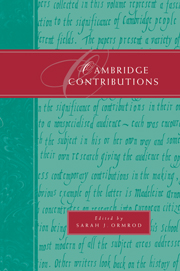Book contents
- Frontmatter
- Contents
- Notes on contributors and contributions
- Preface
- 1 Some Cambridge contributions to astronomy and cosmology
- 2 Cambridge's contribution to medical science
- 3 Cambridge and the study of English
- 4 The Cambridge contribution to economics
- 5 ‘Nasty forward minxes’: Cambridge and the higher education of women
- 6 Cambridge Classics for the third millennium
- 7 Cambridge contributions: the philosophy of science
- 8 European citizenship and education
- 9 The University Botanic Garden
- 10 Geophysics in Cambridge: extinct and active volcanoes
- 11 Cambridge spies: the ‘Magnificent Five’, 1933–1945
4 - The Cambridge contribution to economics
Published online by Cambridge University Press: 31 December 2009
- Frontmatter
- Contents
- Notes on contributors and contributions
- Preface
- 1 Some Cambridge contributions to astronomy and cosmology
- 2 Cambridge's contribution to medical science
- 3 Cambridge and the study of English
- 4 The Cambridge contribution to economics
- 5 ‘Nasty forward minxes’: Cambridge and the higher education of women
- 6 Cambridge Classics for the third millennium
- 7 Cambridge contributions: the philosophy of science
- 8 European citizenship and education
- 9 The University Botanic Garden
- 10 Geophysics in Cambridge: extinct and active volcanoes
- 11 Cambridge spies: the ‘Magnificent Five’, 1933–1945
Summary
I am a Fellow of Jesus so I must start with the person Keynes called ‘the first of the Cambridge economists’, Thomas Robert Malthus, as you would say, but according to Keynes, as the name is an adaptation of Malt house, the correct pronunciation is Malt-house. You may see his portrait in the dining hall of Jesus College. Keynes called him ‘the first of the Cambridge economists’ because he was the first chap to think like Keynes (Keynes never did consider modesty a virtue). I have a great affection for Malthus, partly because he had a stock (or perhaps a flow) of one-liners which I enjoy. In the first edition of his famous essay on population you will find some really funny remarks about the nature of the passion between the sexes which he thought was as near to a constant as would be likely to be found amongst human beings. When he was arguing with his dad, who took a Godwin stance on the possibility of perfection of humanity, Malthus, as befits a member of the Church of England, was more gloomy. He said there are two great constants: one, the passion between the sexes; the other, the fact that, as population grew, since there was a limit to the quantity of land and also to its quality, food and other necessaries would not grow as fast and so we would always be near to the constraints of starvation and misery.
- Type
- Chapter
- Information
- Cambridge Contributions , pp. 65 - 87Publisher: Cambridge University PressPrint publication year: 1998
- 1
- Cited by

